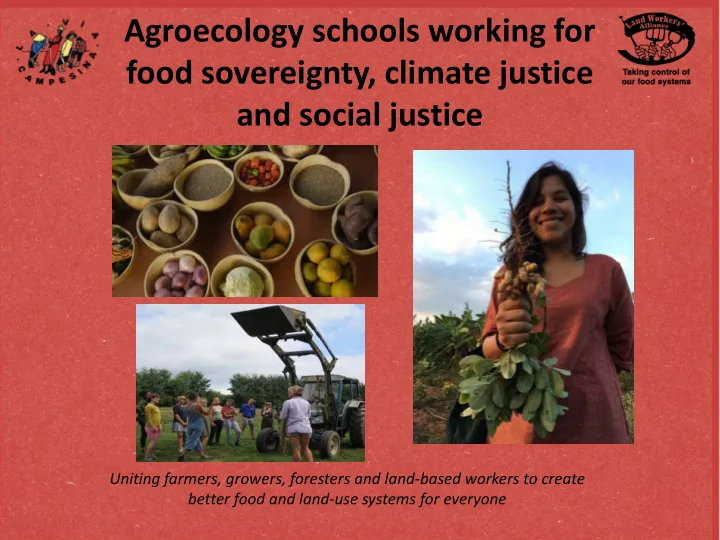

Agroecology schools working for food sovereignty, climate justice and social justice Uniting farmers, growers, foresters and land-based workers to create better food and land-use systems for everyone
Reflection • Who and what inspired you to learn what you know today? • How did you learn it? • What were and/or are the barriers you are facing in working the land?
Nyeleni Agroecology Declaration (Mali 2015) ‘Agroecology is a way of life and the language of Nature that we learn as her children. It is not a mere set of technologies or production practices. It cannot be implemented the same way in all territories. Rather it is based on principles that, while they may be similar across the diversity of our territories, can and are practiced in many different ways, with each sector contributing their own colours of their local reality and culture, while respecting and our common, shared values.’ ‘The diverse knowledge and ways of knowing of our peoples are fundamental to Agroecology. We develop our ways of knowing through dialogue among them ( diálogo de saberes ). Our learning processes are horizontal and peer-to-peer, based on popular education. They take place in our own training centres and territories (farmers teach farmers, fishers teach fishers, etc.), and are also intergenerational, with exchange of knowledge between youth and elders. Agroecology is developed through our own innovation, research, and crop and livestock selection and breeding. ’ Nyeleni interviews :https://www.youtube.com/watch?v=Ab82gAfh554
La Via Campesina and Agroecology Schools • Around the world, La Via Campesina has more than 70 schools and training processes based on popular education, which is a method and an approach that puts forward the scaling up of agroecology at the territorial level and the strengthening of peoples’ food sovereignty. These schools are organised by member organisations globally and are working to build social and climate justice.
Soul Fire Farm ”What is the vision and practice of agroecology training and exchange for Soul Fire Farm?’ Photoslide here: https://photos.google.com/share/AF1QipNBRsGTVEVy5TZ6T2e- 1YGjsJyYOQ615mO47Fv7eBRSzbWXgeh51gVWw7LULyCZCQ?key=ekNuVzdMNHhDYll0 aGNwTnFpUEdrMFZtcmRmUTV3
The Landworkers ’ Alliance Agroecology Training and Exchange Network We recognise that many new entrant farmers don’t have access to intergenerational knowledge, mentors, guidance or a connection in their living memory to the land. We aim to: 1. Increase the skills and knowledge of our members in agroecological farming, growing, forestry and land management; running financially sustainable land-based businesses; and organising as a union and social movement. 2. Fill the gaps for practical training and mentoring in agroecological farming and land management 3. Build low-cost and reciprocal models for training and exchange based on the knowledge base of our membership network
Agroecology Training and Exchange Main activities: 1. Traineeship Program and curriculum 2 . Farm start network 3. Mentoring scheme 4 . Farm hacks 5. Farmer-to-farmer exchange groups 6. Developing knowledge and training around Seed Sovereignty 7 . Political training in food sovereignty and campaigning 8. Facilitation, organizing and movement building training.
What sort of agroecology schools and training programs do we want to see across the UK? What should LWA training programs include? What are there barriers you face to access training?
Agroecology schools working for food sovereignty, climate justice and social justice Uniting farmers, growers, foresters and land-based workers to create better food and land-use systems for everyone
Recommend
More recommend